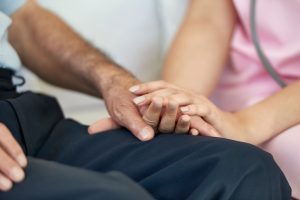 People with lung cancer who also experience anxiety may die more quickly than their peers who do not experience anxiety, a study published in the Journal of Pain and Symptom Management reports. Researchers also assessed the effects of depression, but found it did not increase mortality in lung cancer patients.
People with lung cancer who also experience anxiety may die more quickly than their peers who do not experience anxiety, a study published in the Journal of Pain and Symptom Management reports. Researchers also assessed the effects of depression, but found it did not increase mortality in lung cancer patients.
Lung cancer is one of the most lethal forms of cancer, and tends to quickly spread to other areas of the body. According to the American Lung Association, it is the leading cause of cancer deaths in both men and women. Its five-year survival rate is 17.7%. When detected early and still localized to the lungs, lung cancer survival rates rise to 55%, though early detection typically only occurs in 16% of cases.
Anxiety Increases Lung Cancer Mortality
The study followed 684 people who sought treatment for lung cancer between 2004 and 2010. The participants each had non-small cell lung cancer, with a 30-46% survival rate after one year with the disease. Each participant routinely completed a psychological screening to assess for anxiety and depression.
In May 2012, researchers assessed participant survival rates. Even after controlling for other predictors of mortality, such as medical history, type of cancer, and demographic group, people with anxiety were more likely to die from lung cancer and other causes. The researchers found no association between depression and increased mortality.Managing Mental Health Concerns in People with Cancer
Anxiety is common in people with cancer, especially after receiving a cancer diagnosis. A 2012 study published in the Journal of Affective Disorders found 19% of people with cancer experience clinical levels of anxiety, and 22.6% experience subclinical anxiety symptoms.
The study’s authors highlight the need for greater understanding of cancer’s psychosocial effects. If anxiety makes cancer more lethal, than anxiety management is an important component of cancer treatment.
Another recent study suggested psilocybin mushrooms—so-called “magic” mushrooms—could ease depression and anxiety in people with cancer.
References:
- Linden, W., Vodermaier, A., Mackenzie, R., & Greig, D. (2012). Anxiety and depression after cancer diagnosis: Prevalence rates by cancer type, gender, and age. Journal of Affective Disorders, 141(2-3), 343-351. doi:10.1016/j.jad.2012.03.025
- Lung cancer fact sheet. (2016, November 3). Retrieved from http://www.lung.org/lung-health-and-diseases/lung-disease-lookup/lung-cancer/resource-library/lung-cancer-fact-sheet.html?referrer=https%3A%2F%2Fwww.google.com%2F
- Vodermaier, A., Lucas, S., Linden, W., & Olson, R. (2017). Anxiety after diagnosis predicts lung-cancer specific and overall survival in patients with stage III non-small cell lung cancer. A population-based cohort study. Journal of Pain and Symptom Management. doi:10.1016/j.jpainsymman.2016.12.338
© Copyright 2017 GoodTherapy.org. All rights reserved.
The preceding article was solely written by the author named above. Any views and opinions expressed are not necessarily shared by GoodTherapy.org. Questions or concerns about the preceding article can be directed to the author or posted as a comment below.

 How to Discuss Cancer with a Child
How to Discuss Cancer with a Child 5-Step Mindful Walk: Reconnecting with Yourself after Cancer
5-Step Mindful Walk: Reconnecting with Yourself after Cancer 5 Ways to Boost Your Support Network in Your Cancer Journey
5 Ways to Boost Your Support Network in Your Cancer Journey